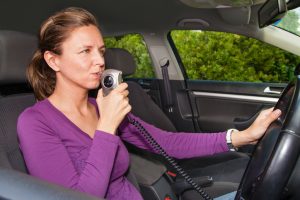
Even people with high alcohol tolerances can drink too much and find themselves in a situation where police stop their car for suspicion of driving under the influence (DUI) or Driving While Intoxicated (DWI). In these situations it is important that a person remember three basic rules: (1) don’t refuse a Breathalyzer Test, (2) don’t answer any questions even if the officer threatens to arrest you, and (3) tell the police officer about any physical limitations and injuries which would affect your balance or movement.
- Don’t refuse a Breathalyzer Test
In Pennsylvania, everyone who drives a car on the road has given police implied consent to conduct a Breathalyzer Test. If you refuse the breathalyzer, Pennsylvania Department of Transportation (PENDOT) can still suspend your driver’s license for 12 to 18 months even if you’re not convicted in criminal court. The reason is because driving is a privilege in Pennsylvania and PENDOT can impose a suspension through its administrative powers which are separate from criminal proceedings. Therefore even if your attorney wins your DUI case, PENDOT can still suspend your driver’s license.
If you take the Breathalyzer Test you will not only avoid a potential civil penalty from PENDOT but it can also improve your criminal case. A good attorney can dispute the results of a Breathalyzer because there are a number of issues can affect a BAC reading.
- Don’t Answer Any Questions
If you are stopped for suspicion of DUI, police more than likely are going to arrest you no matter what you tell them. A typical question from a police officer is “have you had anything to drink tonight?” People will tell the officer they are coming from a friend’s house and just had one drink. However they are better off telling the officer that they aren’t going to answer any questions but that he is free to give a Breathalyzer Test or a Field Sobriety Test. Police officers are trained in the law and understand that everyone has the constitutional right to remain silent. Most police officers will respect this right and simply continue with the traffic stop by giving you a field sobriety test or taking you into custody.
Keep in mind you could be arrested for a DUI even if you are not driving. If you have actual, physical control of a vehicle while under the influence, then that can be enough for an officer to arrest you. In Pennsylvania, the terms “operating” and “actual physical control” are basically the same. They generally mean that the driver is in the vehicle and could make it move, even if the driver is not trying to move the care when the officer finds him. Therefore, telling the officer why you were sleeping in the car while the radio and the heat are on will not help your case.
Answering questions will never improve your DUI case because the officer is probably asking the question because he either smells alcohol on your breath or observed your car swerving or violating some traffic law. This is what gave the officer probable cause or reasonable suspicion to stop your car in the first place. If you answer a question it will only hurt your DUI case because you’ve given the police more circumstantial and possible direct evidence of your intoxication. A statement like “I only had a little to drink,” or “I am coming from a party,” can persuade a judge that the police officer had probable cause to arrest you. It’s always better to remain silent and simply cooperate with the police officer with regards to field sobriety tests, Breathalyzer Tests, and blood tests, but never make any verbal or written statements.
- Tell the Police Officer about any Physical Limitations You’ve Had in the Past
A standard field sobriety test requires that a person perform certain movements so that a police officer can assess a person’s motor skills. These tests, however, are often difficult to perform even for a person who has not consumed any alcohol. There are three standard field sobriety tests – (1) the walk and turn, (2) the one leg stand test, and (3) the Horizontal Gaze Nystagmus (HGN) test.
The first two tests require you to walk on a straight line or balance on one foot. If you’ve had any type of surgery, played sports, or have any knee or leg injuries this will affect your ability to perform these tests correctly. Telling the officer that you’ve had an injury in the past will put the police, the prosecution, and the court on notice that the results of the field sobriety test may not be a fair indication of your intoxication. This will also allow your criminal defense lawyer to argue that the police didn’t have probable cause to arrest you based on the results of the field sobriety test.
With regards to the HGN Test, police officers are trained in the law but there is a great deal of case law which says that they can’t fairly use the results of the HGN Test to determine a person’s impairment. HGN is the involuntary jerking of the eyes and there is a strong argument that only a medical professional can accurately assess the real results of this test.
If you are stopped for DUI it’s important to keep these three rules in mind because it will not only protect your rights but put your attorney in the best position to successfully defend your case. If you have questions call Gregory J. Spadea at 610-521-0604.








